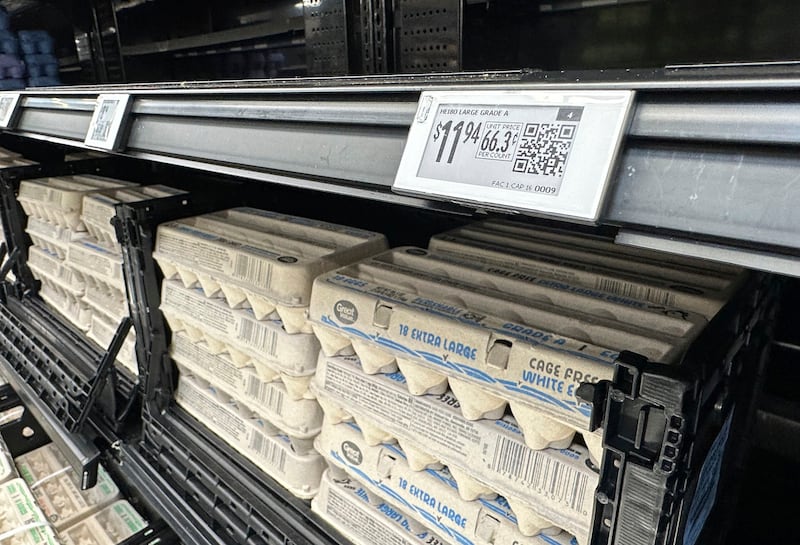In 2022, researchers at the MIT Sloan School of Management studied why the nation was reeling under inflation, which peaked the previous year at 9.1% in June.
Their conclusion was emphatic. The No. 1 culprit was federal spending, and specifically the stimulus checks every American received to cope with the COVID-19 pandemic. It wasn’t corporate greed. It wasn’t supply chain disruptions.
“What was surprising is not just that [the driver] was federal spending but that it was so overwhelmingly federal spending,” Mark Kritzman, a senior lecturer at MIT Sloan, was quoted as saying in a report on the study posted on MIT’s web site.
Why do I bring this up? Because President Trump is floating the idea of giving Americans (with the exception of “high income people,” whom he didn’t define) $2,000 tariff rebate checks.
This likely would do pretty much the same thing the pandemic checks did, which is to stimulate higher inflation. The exception is that this time there wouldn’t be any sort of pretense about helping people through a crisis they had no hand in generating.
Tariff revenues
I can hear some of you saying, “Evensen, this isn’t going to cause inflation because the checks would be paid for in advance by the money Trump’s tariffs have raised.”
About that — The Committee for a Responsible Federal Budget, a private research organization, estimates tariffs will raise about $300 billion in new income this year. It estimates that, if the rebates are structured the same as those stimulus checks were, they would cost about $600 billion, or twice as much as is coming in.
According to those estimates, to keep this plan revenue-neutral the rebates would need to be sent out once every two years.
Estimates vary because Trump has not divulged the details of his plan.
Tomas Philipson, a professor of public policy studies at the University of Chicago and former acting chair of the White House Council of Economic Advisers, notes it would take $200 billion to give checks to 100 million people. He told CNBC, “if [Trump] includes 200 million Americans, we are up to $400 billion.”
Any of these levels would greatly reduce the amount tariffs might be used to reduce the national debt, which the president said he would like to do. On X, the president posted that the tariffs are bringing in trillions of dollars. There is no evidence substantiating that figure.
Americans pay the tariffs
Because American businesses pay tariffs at the point a product enters the country, and because these costs are passed on, at least in part, to American consumers, they are inflation stimulators on their own. It would make more economic sense to reduce tariffs to a point where they provide about a $2,000 benefit to each household in the form of lower prices.
The Tax Foundation, another private, non-partisan organization, said in a report last summer, “Tariffs are not an efficient way to raise revenue because imports fall as tariffs increase, eventually reducing the revenue that can be collected when those rates become punitively high. Their revenue-raising potential falls further when accounting for their negative impacts on economic growth, as tariffs impose costs on businesses and consumers.“
The foundation also said, “While tariffs have undoubtedly raised costs for American firms and consumers — since Americans and not foreigners ultimately pay the tariff — rebating the revenue to consumers would be fiscally irresponsible and also risk increasing inflation.”
Economic indicators remain strong
At the risk of sounding cruel to those Americans who struggle to make ends meet, the nation, generally speaking, does not need the money right now. The economy grew at an annualized rate of 3.8% in the second quarter of this year, according to the U.S. Bureau of Economic Analysis. Unemployment is hovering around 4%, although accurate figures have not been available due to the recent government shutdown.
Inflation, however, was hovering around a stubborn 3% in September.
CNBC quoted Stephen Kates, a financial analyst at Bankrate, saying, “Money is money, and when more money comes into the economy to chase the same amount of goods and services, it’s going to be inflationary.”
Reducing tariffs, however, would increase the amount of goods while also raising the purchasing power of individuals.
Hovering ominously over these arguments is a pending Supreme Court decision on the legality of the president’s presumed power to unilaterally impose tariffs in the first place.
Democrats learned last year that the public is unforgiving when it comes to rising prices. As much as people may appreciate an extra $2,000 check in the mail, they ultimately may be angered by how little it buys.



